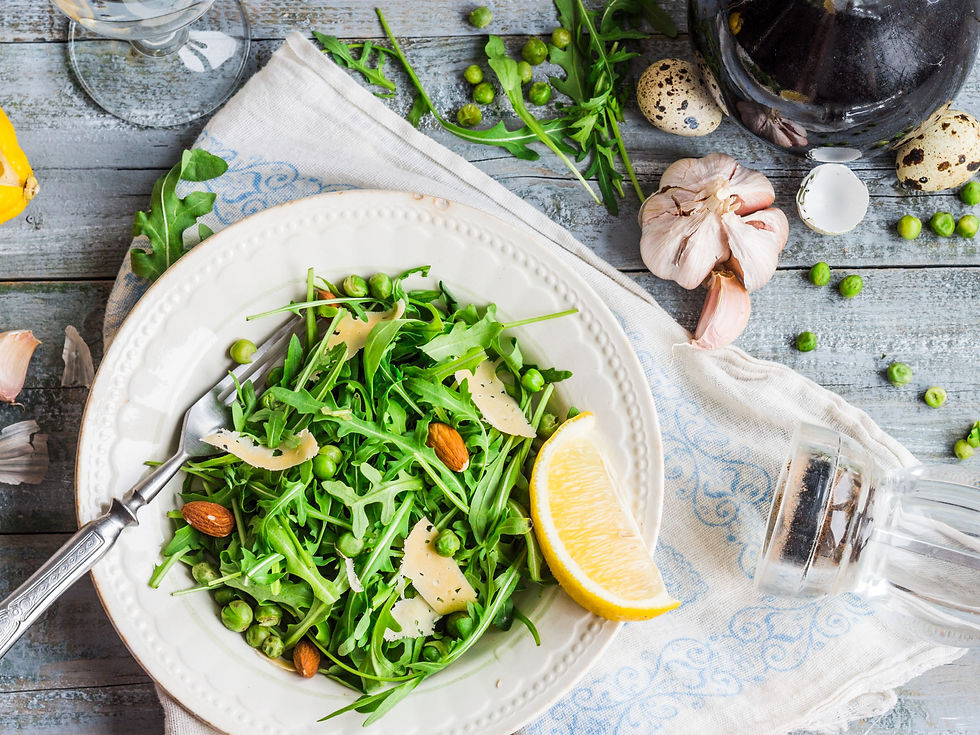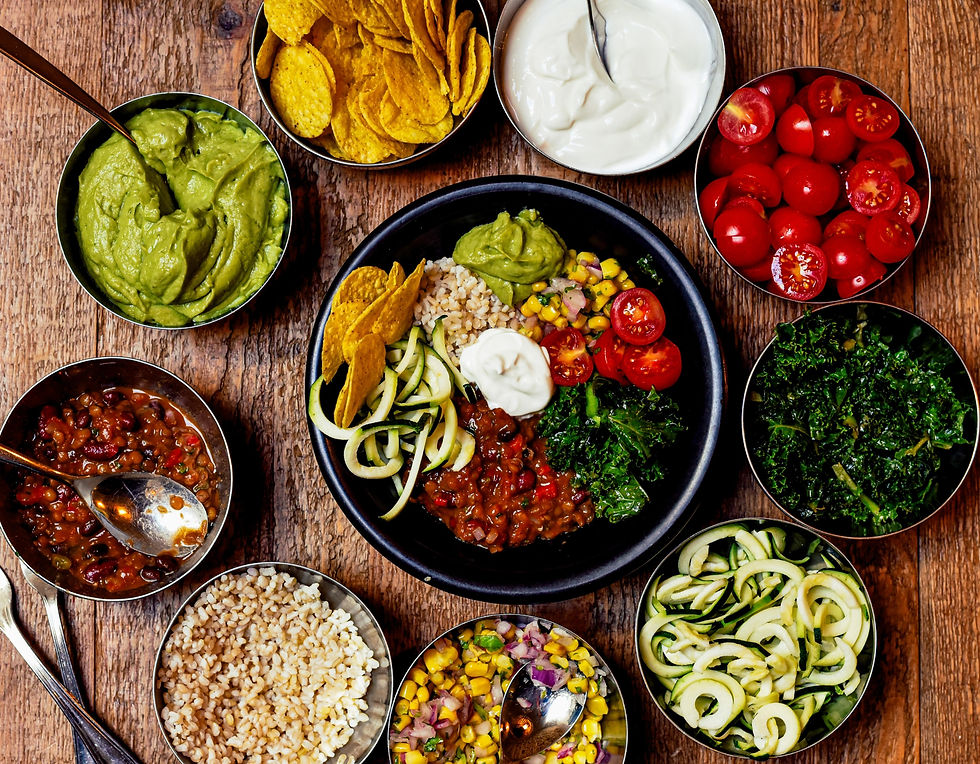How to Lose Weight With Vegetarian Diet - Weight Loss Guide
- Dr. Ashna

- May 4, 2022
- 7 min read
Updated: Jul 7, 2022

At first, weight loss can seem so easy. Just swap out your junk food with some plates of salad. But this is rarely the truth. In reality, many people still feel like they're falling short of their weight loss goals. If you're one of them, it's time to look at the other side of the coin.
People often try to find diets that will not require them to sacrifice their meat intake. Sometimes you want to kick back and eat a burger. Whether or not you're okay with sustaining yourself on primarily leafy greens, there are ways to have meat substitutes and maintain a vegetarian diet without losing your satiety.
The truth is that many vegetarians find it harder to achieve a feeling of fullness compared to those who are fine with meat intake. However, there are ways you can make sure that you're not one of them if you want to know how to lose weight without giving up your diet!
What Does a Vegetarian Diet Entail?
While you may have found it easier to maintain a vegetarian diet, you may have also found that it is a bit of a challenge. You'll find that some of the staples in your diet will be missing. But don't worry, because there are ways to get around this.
Before we get ahead of ourselves, though, it's essential to know what a vegetarian diet entails. What makes a diet vegetarian? Well, vegetarian diets are also referred to as plant-based eating.
This means that you don't eat meat, fish, poultry, or other animal-based foods. Instead, you eat plant-based foods in a vegetarian meal. Vegetarian recipes involve vegetables, fruits, grains, nuts, and seeds.
You'll also find that many people on a vegetarian diet include dairy products. You'll also find that many vegetarians involve eggs in their diet, and some vegetarians even consume dairy products and eggs. You can find more about vegetarian diets and vegetarian foods by reading on.
So, now that we know what a plant-based diet entails, you might be wondering how to create an effective whole-food, plant-based diet that is sustainable for a long-term weight loss process. Luckily, we have compiled some pointers to help you out.

Nutrition Over Calorie
To maintain a healthy weight, you need to know how to lose weight without giving up your diet. You'll find that many people who have successfully maintained a vegetarian diet have managed to do so because they understand the importance of nutrition over calorie intake.
This is because many people are under the impression that they'll automatically lose weight if they cut out meat. However, this is rarely the case. Instead, it would help if you focused on nutrient-dense, low-calorie foods that are good for your health. This means eating more fruits and vegetables naturally low in calories and packed with nutrients.
If you're trying to achieve weight loss goals, you should include more fruits and vegetables in your diet. It would help if you added more whole grains into your meals instead of refined grains such as white bread or pasta. These foods can help you meet your daily nutrient needs while also helping you keep an eye on calories.
For those who are used to plant-based diets, you may be surprised at how easy it is to transition into a vegetarian diet without feeling like anything is missing from your diet at all!
In general, you should train your eyes well to skim through nutrition labels quickly to make snap judgments on what plant-based foods are more beneficial for you in the long run.

Food Swapping: Finding the Right Alternatives
If you're finding the prospect of doing a hard turn to an animal-free diet quite intimidating, don't worry. It is best to gradually make these changes to plant foods and find alternatives to the typical animal products you are used to.
While you can find vegetarian foods that are just as tasty as the alternatives, you should try to make the transition gradually. You should also include these foods in your diet from the beginning of your weight loss journey to not feel like you're missing out on anything.
By doing this, you'll be able to break from the old habit of eating meat, fish, poultry, and eggs in your diet and thus slowly integrate more plant-based foods into your diet without feeling like you're missing out on anything.
For example, you can replace meat with beans or lentils for a hearty meal or try cooking a vegetable lasagna using tofu or beans instead of ground beef or other animal-based products. If you're craving some French fries opt-out for one made out of sweet potatoes instead.
Don't Skip Out on Proteins
Being a vegetarian means avoiding meat, which is usually the core source of proteins. So following a vegetarian diet can mean that they can quickly run out of animal protein in their diet without realizing it.
Most vegetarians will often miss out on these critical nutrients because they tend to fall short of plant-based protein sources in their diet. If you're not getting adequate protein, you'll find that you'll struggle with maintaining your weight at times. So be sure to check out the best protein sources for vegetarians and ensure that you're eating enough of them!
Sometimes, you're still not getting enough protein daily despite your best efforts. In this case, you can also get additional protein through protein shakes or plant-based sources such as beans, nuts, and seeds.
Try to increase your intake of protein foods to get the necessary nutrients. Remember that you can always find vegetarian protein sources to help you get a complete and balanced diet. So, make sure that you're getting enough of them!
Prepare For That Afternoon Snack
Often, people fail in their attempt to go through with a diet because they keep getting sudden cravings for a few of their favorite foods. The truth is that these cravings are usual. You'll find that when you're on a diet, you'll find that you tend to eat more during the day than you usually would.
When you're eating less, your body naturally has to compensate for the lack of calories and thus make up for it by snacking more during the day.
It's also normal to crave some unhealthy snacks when you're on a diet. So, don't get too worried about this and instead enjoy your favorite treats in moderation.
In addition to this, it's also essential to prepare yourself for that after-lunch snack. Sometimes, people trying to lose weight may get hungry at around 2 p.m., leading them to reach out for some high-fat snacks or food items to satiate their hunger pangs. This can lead them to further overeating as they feel they have eaten enough already.
To avoid this from happening, try making sure that you have healthy snacks, such as plant-based snack bars, available throughout the day to always take care of your hunger without going through any cravings.
Watch Out For Liquid Calories
As you lose weight, you may also want to ensure that you don't gain it back. To achieve this, you'll need to be aware of liquid calories and ensure that you're not drinking too much.
Most people will find that they eat more when on a diet. This is because their bodies have been craving food, which can happen when you're on a diet.
However, this doesn't mean that you should give in to these cravings. Instead, it's essential to know how to lose weight without giving up your diet to make sure that your diet plan is sustainable for the long run.
Often, people turn to sources of liquid calories to quench their mid-day cravings. This can be in sugary drinks, such as a tall cup of latte or some soda pop.
These beverages are usually high in sugars and thus are not ideal for weight loss. Instead, it would help if you opted for a more nutritious beverage, such as herbal tea or black coffee. So, remember to keep track of your liquid calories to ensure that you're not overeating them and putting on weight.
Keep Track of Your Portions
One thing that can help you maintain a healthy weight is to make sure that you're taking the right portions of your meals. Many people find it hard to eat the right amount because they tend to overeat at once.
If this is happening to you, you should note this so that you can change your eating habits. You can start by eating smaller portions or perhaps breaking your regular meals into smaller ones throughout shorter intervals.
If possible, try taking small bites of your food instead of chowing down on the whole thing in one go. This will help you track how much food is going into your body and thus make sure that you're not overdoing it. If possible, make a habit out of doing this as well! This will help ensure that you don't overeat while on a diet.
The Basics of Caloric Restriction
Many people trying to lose weight will go on a calorie-restricted diet. This means that they'll restrict their calorie intake to shed some pounds and get back to their ideal weight. Some people do this by way of calorie counting, for example.
However, when you're on a calorie-restricted diet, you'll find that you will have to be more careful about what foods you're eating. For example, if you want to cut down on the amount of fat in your diet but aren't ready to give up on your sugar and milk, then this is where you need to be able to make intelligent decisions.
In this case, try opting for high-protein sources such as nuts and seeds in place of the usual sources of fat. This will help keep your body satiated and avoid overeating during the day while still cutting back on calorie consumption.
You should also avoid skipping meals altogether so that you don't fall into the trap of binging at night and giving a considerable increase in your daily calories.
By being more mindful about what foods you're eating and preparing yourself for cravings and hunger pangs throughout the day, it's easy for you to go through with a calorie-restricted diet without feeling like anything is missing from your diet.
Get Sufficient Physical Activity
Achieving weight loss is all about exercising. However, many people find it challenging to get enough exercise because they are busy with their daily lives. In this case, it's essential to make sure that you're not letting your weight loss journey fall through the cracks just because you're busy.
When trying to lose weight, you must get enough physical activities done daily. When you're on a diet, it's straightforward for your body to slip into a catabolic state and burn off more calories than usual.
This can then lead to weight gain as your body goes into starvation mode and stops burning calories even though there are plenty of them available in your diet.
To avoid this, try getting some light physical activity every day to maintain your metabolic rate and burn off more calories to achieve your weight loss goals! You can also increase the intensity of your workouts if this is what works best for you. Remember that even a little bit of exercise will help!




Comments